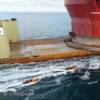NGOs Furious on Lack of Arctic Action
The Clean Arctic Alliance expressed frustration over Members States’ failure to address the risk to the Arctic from emissions of black carbon from international shipping, after a meeting of the International Maritime Organization’s Marine Environment Protection Committee (MEPC 74) closed in London.
A proposal by the Clean Shipping Coalition and Clean Arctic Alliance member Pacific Environment to immediately switch away from heavy fuel oil – a major source of shipping’s black carbon emissions – to distillate fuels did not garner adequate support from Member States.
There was however, broad support among Member States for regulations to control black carbon emissions, said a statement from the Clean Arctic Alliance.
Black carbon is a potent short-lived climate forcer that remains in the atmosphere for only a few days to weeks, but when emitted from ships burning heavy fuel in or near Arctic waters, particles fall on ice or snow, reducing the albedo (reflectivity) and causing more heat to be absorb, thus accelerating the warming of the whole Arctic region.
As well as the second leading cause of global warming, black carbon emissions are also harmful to human health.
“After a decade of debate on black carbon emissions from shipping, IMO member states are squandering their chance to respond to its impacts on the Arctic”, said Dr Sian Prior, Lead Advisor to the Clean Arctic Alliance.
“The IPCC has made clear that we have less than 12 years to counter the worst effects of the climate crisis. Arctic countries and those with an interest in the Arctic have a moral obligation to act on black carbon emissions, following last week’s statement from Finland’s Chair of the Arctic Council, confirming ‘support for enhanced national efforts and international cooperation to reduce black carbon emissions across the Arctic," she added.
“There’s some consolation that as the meeting closed, it was agreed that concrete proposals should be put forward for consideration at PPR 7 in February 2020, but it is a real shame that member states did not seize the opportunity to make some preliminary decisions this week, including that Arctic shipping should move away from heavy fuel oil to lighter fuels, which could immediately cut black carbon emissions by around one-third”, she continued.
“Cutting ship-sourced emissions of black carbon is a rapid path to countering the current climate crisis, and to minimise further impacts from shipping on the Arctic”, said Prior. “While the broad recognition by IMO member states the need for regulations to control black carbon emissions is welcome, it is imperative that the IMO does not spend the next two years generating more hot air before reporting back to MEPC in 2021, instead of taking action.”
During MEPC74, Canada emphasised during a plenary intervention, during the discussion on black carbon, ‘…one of the options could be the mandated use of distillate fuels…taking into consideration the ongoing work on the proposed HFO ban’.
“This signal from Canada adds welcome momentum to the ongoing development by the IMO of an HFO ban on use and carriage as fuel in the Arctic”, said Andrew Dumbrille, WWF Canada’s Senior Specialist on Arctic Shipping.
“Up to now, Canada has been on the fence with taking a position on the ban. However, by linking both the issues of spill impacts and black carbon emissions associated with the use of HFO, banning HFO becomes an extremely effective measure to deal with these urgent threats – it’s time for Canada to be more vocal in its support for the ban,” Andrew added.













